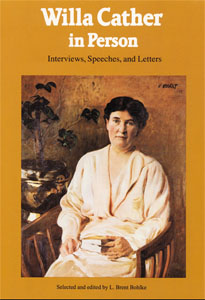 In 1921, Willa Cather told an editor for the magazine Bookman that she only worked for two and a half to three hours each day. “If I made a chore of it, my enthusiasm would die,” she said. “I make it an adventure every day.”
In 1921, Willa Cather told an editor for the magazine Bookman that she only worked for two and a half to three hours each day. “If I made a chore of it, my enthusiasm would die,” she said. “I make it an adventure every day.”
Like so many other writers, Cather preferred working in the morning when she was “fresh” and unencumbered by the day’s concerns. I always prefer working in the morning, too, although my intentions are far better than my practice. For me, the key is getting up early enough to give myself at least an hour before I switch to “mom” mode, which means getting up not a minute later than 5:00. I go to bed most nights believing I will be out of bed by 5:00 the next morning, and then I roll out of bed closer to 6:30 or 7:00, chastising myself and promising to do better tomorrow.
Today was one of those rare days when I happened to live up to my nightly vow. By 5:05 I was at my desk with my coffee, writing. By 6:30, I had written three and a half pages. Those three and a half pages felt more like 20; I felt triumphant, as if I had accomplished a great deal.
And it only took one and a half hours! Cather is on to something here. If you work in short spurts–two hours instead of five–every minute of it is more likely to feel like an adventure. If you can’t afford two hours, try one. If you can’t afford an hour, try thirty minutes. University of Nebraska Press has published a whole book of Cather’s insightful advice on writing, with the utterly unpretentious and spot-on title, Willa Cather on Writing.
Alice Munro, by the way, is a writer who accomplished much of her early success while juggling writing with motherhood. First, she wrote while her youngest child napped, and later, she wrote while her children were at school. Toni Morrison’s time was so limited as a single mother with a nine-to-five job that the time she did manage to find at the typewriter was rich with possibility. “By the time I get to the paper something’s there,” she said. “I can produce.”
No matter when you are able to make it to your writing desk, or your notebook, try to approach it as an adventure, not a chore. Merely having the privilege of an hour to write can be an adventure in itself.
This week, when you sit down to write, attempt to do it with a sense of enthusiasm for the hour that you have, the hour that will never repeat itself, this spectacular, beautiful, unique hour in which anything can happen.